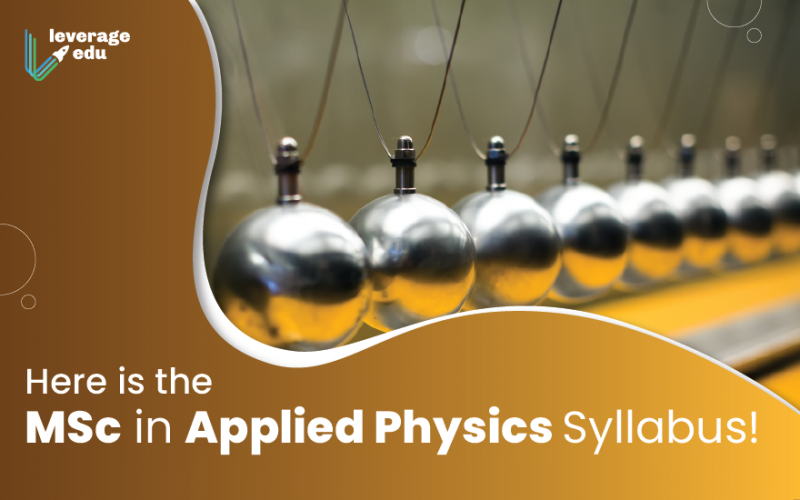Master in Applied Physics is a 2-year postgraduate multidisciplinary degree that focuses on both the fundamental concepts of the physical sciences and the utilization of these scientific principles in practical work. The course can also be taken up on a part-time or full-time basis depending on the respective University. This blog provides you with all the necessary information regarding the MSc in Applied Physics Syllabus.
| Course Name | Masters in Applied Physics |
| Course Level | Postgraduate |
| Duration | 2 years |
| Eligibility | Bachelor’s degree with 55-60% marks |
| Admission Process | Direct Admission + Entrance Test |
| Average Salary | INR 2-10LPA |
| Job Positions | Laboratory Technician, Research Specialist, Geographer, Electronic Engineer, Science Adviser, Biology Researcher, Plant Biochemist, Teacher & lecturer |
This Blog Includes:
About Masters in Applied Physics
MSc in Applied Physics is a specialized degree that merges theoretical knowledge with practical experience. The program combines the fundamental principles of physics with practical and professional expertise in one of the seven specialities: chemical physics, atmospheric physics, computational physics, material science, geophysics, physical oceanography, and physical electronics. After a 2 year successful course, students go on to occupy positions in various private organizations, universities, laboratories, Physics research institutes, etc. Students can opt for this course on a part-time and full-time basis.

Eligibility Criteria
Although the eligibility criteria may vary from University to university, below is a list of general requirements for the course:
- The candidate must have a graduation degree in the relevant field from a recognized University.
- Candidates must have a minimum of 55-60% marks in their graduation.
- Candidates must also meet the other specific requirements of the University to which they wish to apply.
- Some Universities hold their entrance examinations which the students have to pass.
- For admission abroad, candidates must take an English proficiency test such as IELTS, TOEFL, or GRE.
MSc in Applied Physics Syllabus
Different universities offer different course plans for MSc in Applied Physics. Given below is a general overview of the subjects taught in the course:
| Semester I | Semester II |
| Mathematical Physics | Mechanics II: Quantum and Statistical |
| Mechanics I: Quantum and Statistical | Electromagnetic Theory II and Crystal Physics |
| Electromagnetic Theory I | Modern Optics |
| Mechanics of Deformable Elastic Solids | Physics of Semiconductor Devices |
| Practical including continuous assessment | Electronics I |
| Semester III | Semester IV |
| Optical, Dielectric and Magnetic Properties of Materials | Physical Techniques in Industry |
| Plasma Physics | Non-Destructive Testing |
| Instrumentation | Luminescence and Its Application |
| Laser and Applications | Electronics III |
| Computational Techniques and Numerical Analysis | Fiber-Optics and Its Applications |
| Nuclear Reactor Physics & Polymer Physics | Crystallization Techniques |
| Electronics II | Physics Of Liquid Crystals |
| Thin Film and Thick Film Technology | Electron Optics and Applied Optics |

Top Universities Abroad
Here are the top universities abroad for pursuing the MSc in Applied Physics:
| University | Location | QS World Ranking |
| Stanford University | USA | 2 |
| Columbia University | USA | 19 |
| John Hopkins University | USA | 25 |
| National University of Singapore | Singapore | 11 |
| New York University | USA | 35 |
| Delft University of Technology | Netherlands | 57 |
| University of Groningen | Netherlands | 128 |
| University of Freiburg | Germany | 175 |
| University of Aberdeen | UK | 207 |
| Northeastern University | USA | 362 |
Top Universities in India
If you want to achieve new heights, you need to make sure you’re studying at one of the most reputed universities in the world. If you need help with a student loan, Fly Finance will always be there to assist you. Here are the top universities in India for pursuing the MSc in Applied Physics:
| College | Location | NIRF Ranking |
| Hindu College | Delhi | 9 |
| Ramjas College | Delhi | 75 |
| Indian Institute of Engineering Science and Technology | Howrah | 27 |
| Hansraj College | Delhi | 14 |
| Madras Christian College | Chennai | 18 |
| Loyola College | Chennai | 3 |
| Ferguson College | Pune | 96 |
| St Xavier’s College | Kolkata | 4 |
| St Joseph’s College | Calicut | 69 |
| Nizam College | Hyderabad | 129 |
FAQs
A dissertation/project is compulsory and you will most likely write a dissertation/project in the third or fourth semester.
Yes, you can expect some practical subjects in all the semesters. The practicals are important subjects and you need to compulsorily clear all the practical exams. The practical subjects include Electromagnetics and Optics Lab, C Programming Lab, Computational Physics Lab, General Physics Lab, Basic Electronics Lab, Modern Physics Lab, etc.
Yes, most likely you will study quantum mechanics in at least 3 out of the 4 semesters. Usually, in the first semester and second semester, you will study Quantum Mechanics- 1 and Quantum Mechanics- 2 respectively.
Yes, elective subjects are a part of the curriculum and in the third and fourth semesters, you can opt for various electives as per your interests.
The above information will give you an insight into MSc in Applied Physics Syllabus. If you plan to take up a career in Applied Physics and need further guidance, contact our experts and counsellors at Leverage Edu on 1800572000 for selecting the right course and right university or visit us on our website.

 One app for all your study abroad needs
One app for all your study abroad needs






















 45,000+ students trusted us with their dreams. Take the first step today!
45,000+ students trusted us with their dreams. Take the first step today!


